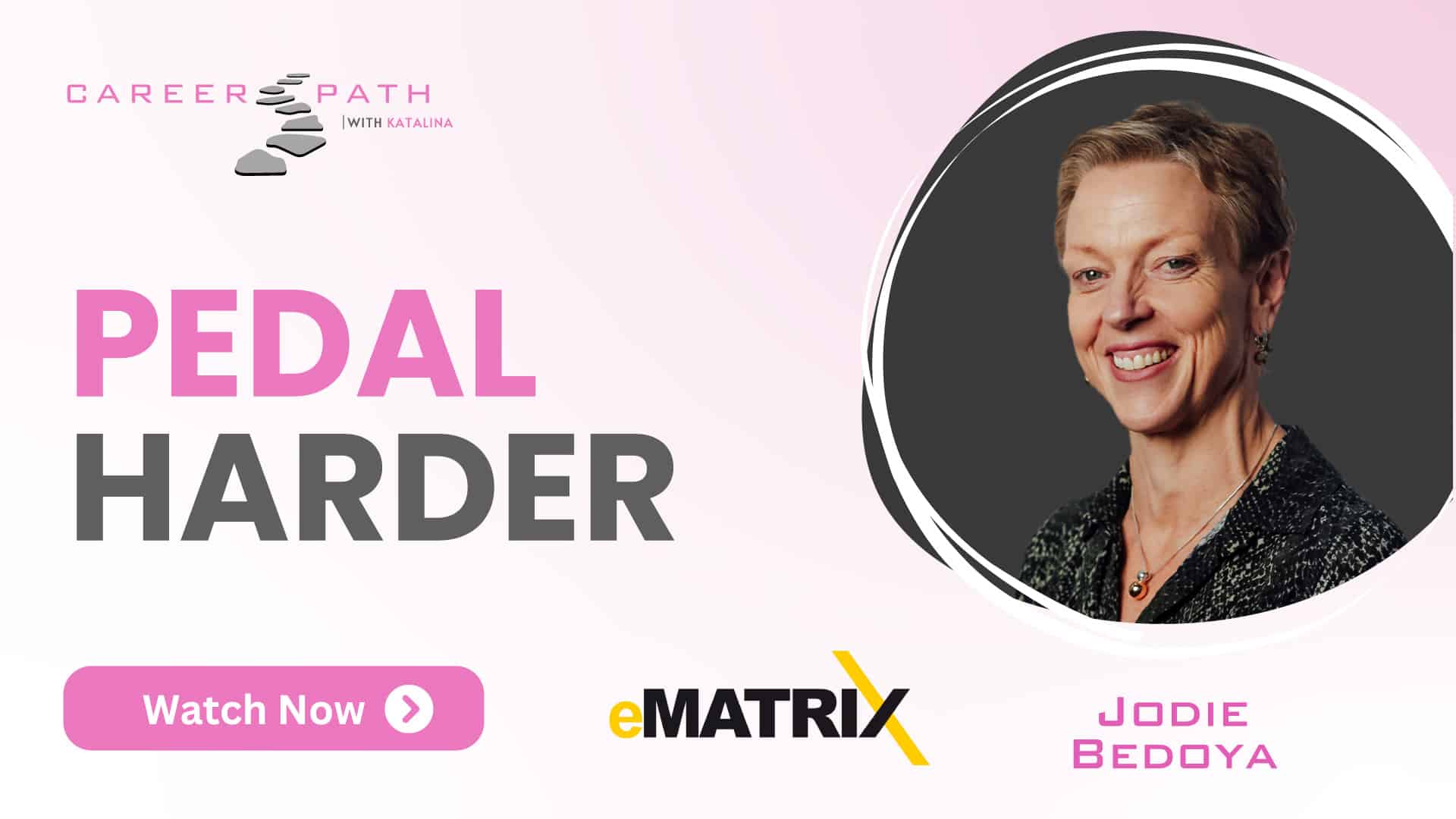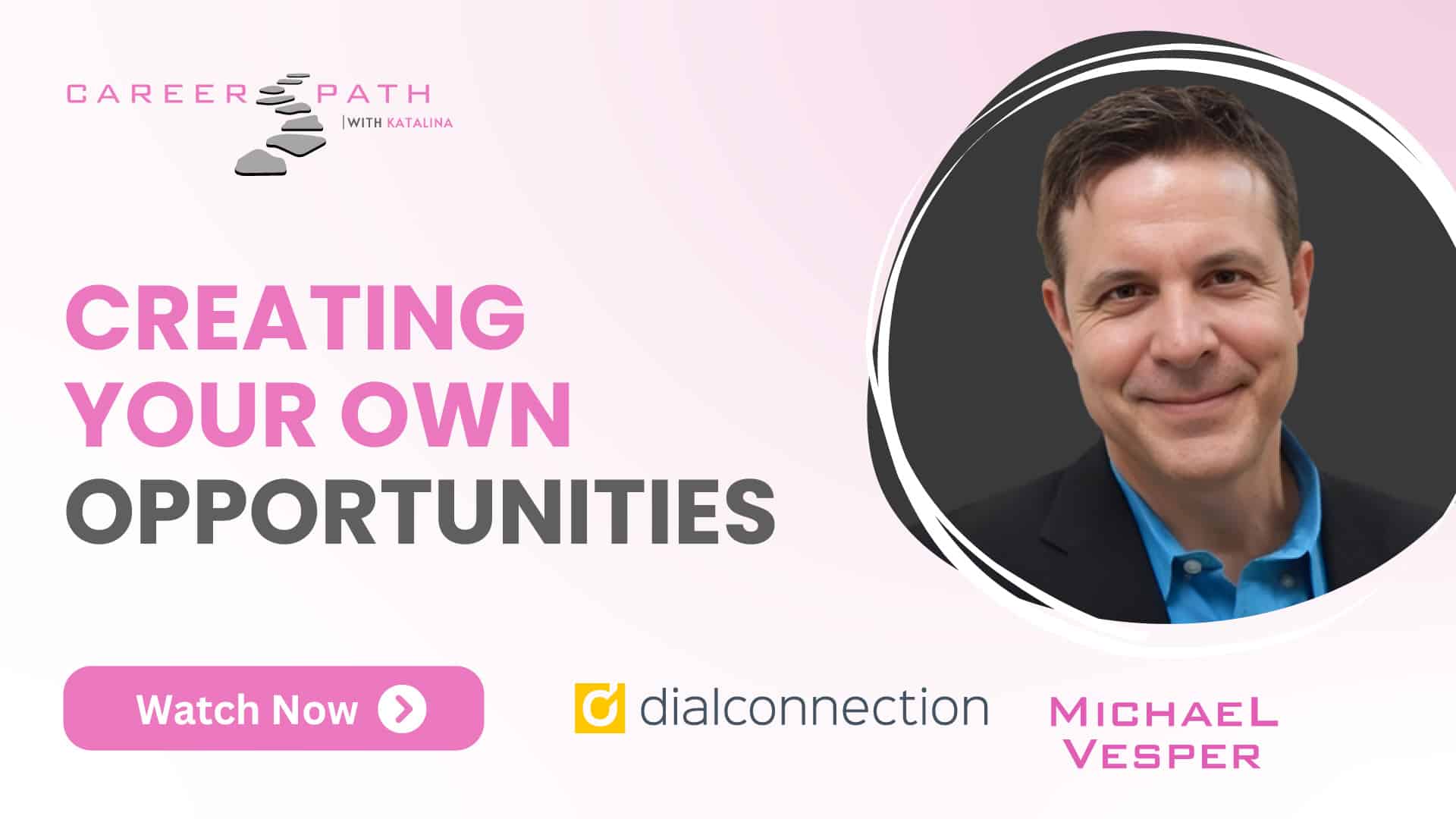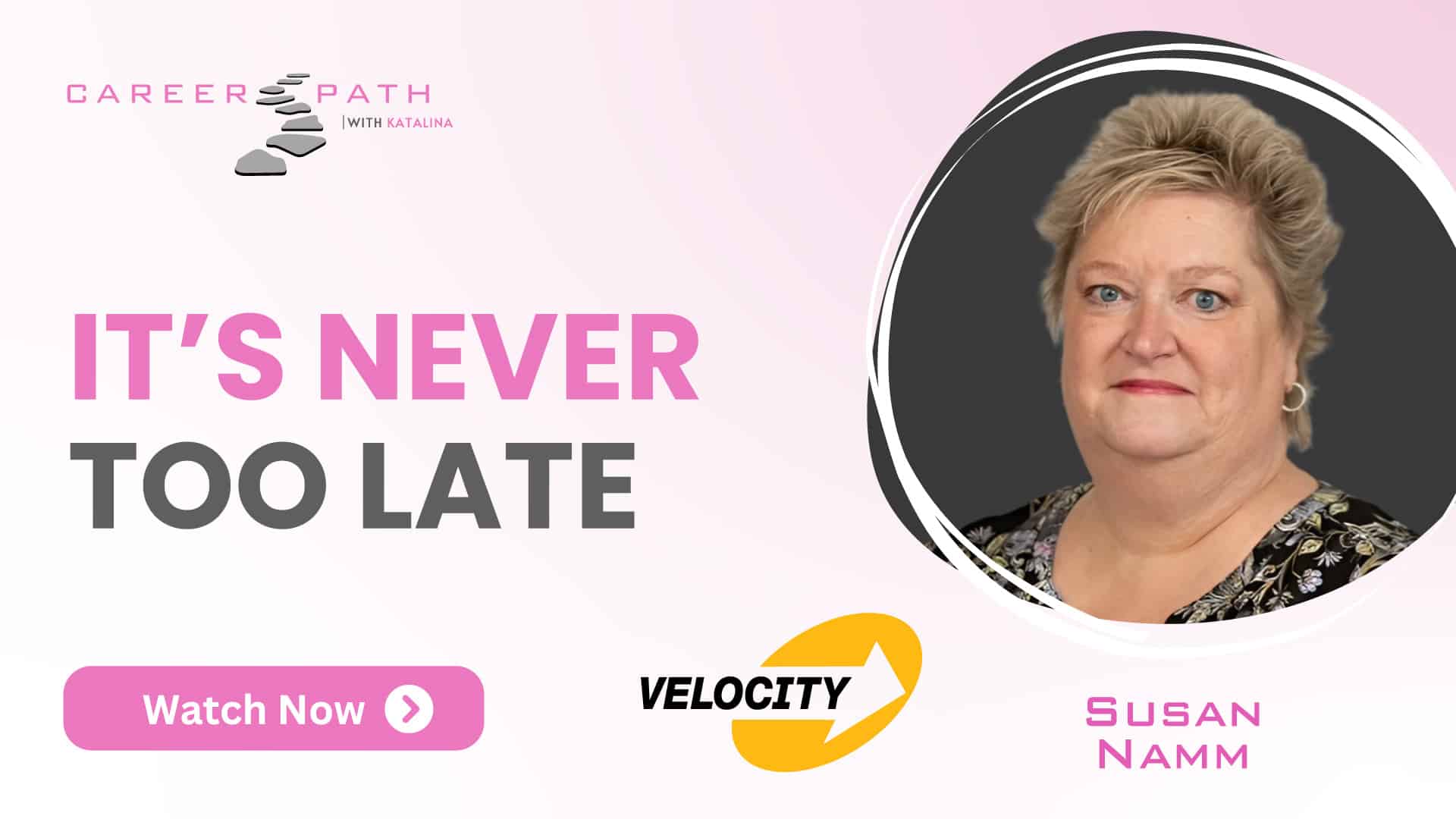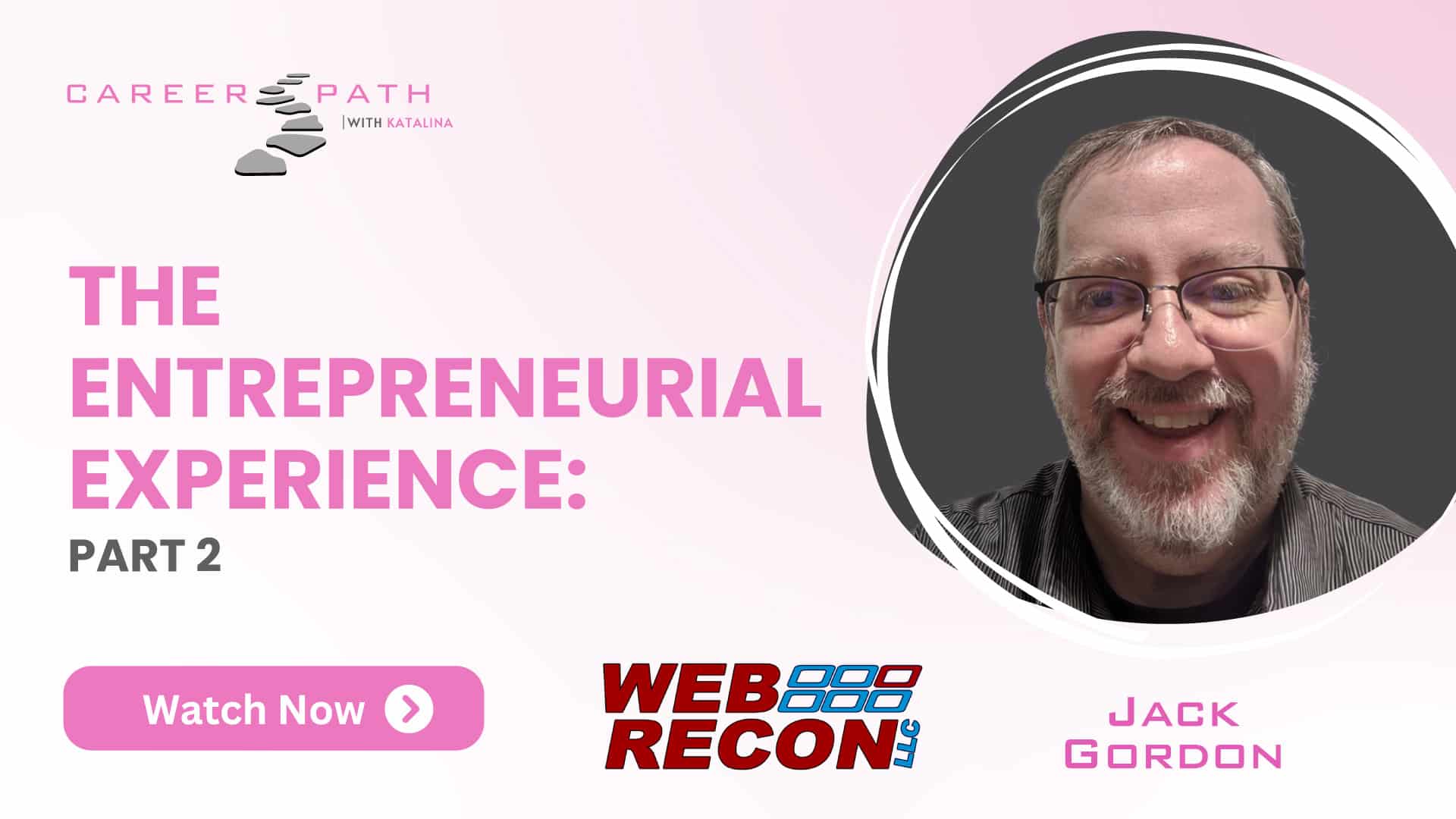Katalina Dawson (00:10)
Hello and welcome back to another episode of Career Path. I am your host, Katalina Today we are gonna be discussing a topic called "Pedal Harder." What does that mean? Well, my guest is gonna tell you exactly what that means in just a moment. Today I have the absolute pleasure of having the incredible Jodie Bedoya joining me today. Not only is she an insanely inspirational person and a wealth of knowledge, but I am so lucky to also be able to call her a friend.
Now, Jodie is the founder and director of eMatrix Training that offers some very unique and extremely valuable training services for collection centers, for call centers. It's very vast. So Jodie, thank you so much for joining me today. It is such a pleasure to have you.
JODIE BEDOYA (00:54)
Thanks Katalina and you called me a friend and I came in wearing pink because I thought you would be and you came in in black so come on what sort of friend are you?
Katalina Dawson (01:01)
I know I failed
my own brand, but I love so much that you're wearing pink. It is so sweet.
JODIE BEDOYA (01:06)
Thank you.
Katalina Dawson (01:07)
Well, can we start out with you telling us a little bit about yourself and how you got to where you are today?
JODIE BEDOYA (01:13)
Yeah, sure. So I started out in my collections days. I started at Toyota Finance and my boss one day said to me, hey, you'd be a really good team leader. I'm going to give you a promotion. I said, fantastic. Doing what? And he said, repossessions. I said, okay, how do I do that? And he said, I'll teach you. And of course he didn't back in the day in the nineties, he just left me. And I remember the first call came through and the customer said, I want to speak to the manager. And I said, yep, that's me. And he said, you can't take my car.
And I said, uh, yeah, can. And I hung up on him and I went, wow, that was so bad. So bad. I knew it was bad, but I didn't know what to say.
Katalina Dawson (01:46)
Thank
Yeah, fair, you weren't trained, but yeah.
JODIE BEDOYA (01:51)
So that was the real, the old days, sink or swim. I mean, I still like that a little bit to an extent these days as well, right? And from there, I just went down the path of debt collection. And I think it's like for most people that are in debt collection, it's not on our list of career paths in high school. So we just fall into it and then we fall in love with it, which I did. So I stayed in debt collection and I worked through different agencies and I was the CEO at
a debt recovery agency. And then I had babies. I went, wow, I'm never seeing this baby I had. So what am I doing? And so I quit and thought, you know what? I can't find any debt collection training. In Australia at the time, I thought every time I sent staff off to training, it was terrible. I thought I'm going to start a debt collection training business. And so I started on the floor of my lounge room.
Katalina Dawson (02:19)
you
JODIE BEDOYA (02:40)
thinking, how do you start up a training company? And that's where it began. And now 13 years later, we do all sorts of training because the radius of our role has expanded. It's not just about collections anymore. It's about we've to consider customer vulnerabilities. It's about staff well-being. It's about the way we coach and lead. So that's all the training that we help organizations.
Katalina Dawson (02:54)
Yeah. And I'm going to do a shameless little plug for you right here because I have personally got to have basically a customer experience from eMatrix and I got to utilize your leadership training, which was incredible. So not only did I use the sessions and I learned through the videos myself, but then I took my team through it and it was an incredible experience. There were people who rarely talk in our organization.
piping up, excited to share stories, to ask questions. Like what you have is truly special. So I love it so much, Jodie. Thank you for what you do.
JODIE BEDOYA (03:30)
No.
Thank you. And I guess that's one of the things when I used to send people to training or I used to go, I found it really frustrating when there was nothing practical to take back to the business. So I think that's what's really important is the practicality of what we do.
Katalina Dawson (03:51)
Absolutely. So speaking of practicality, let's give our listeners a great session here about what it is to pedal harder. Can you explain that topic to everybody?
JODIE BEDOYA (04:02)
Yes, I've been asked recently to do a number of talks for women and I feel a little bit like, well, this is relevant to men as well and I've had quite a few men sitting on the session and it was interesting for International Women's Day, I did a talk and the first person that reached out was a gentleman and he said, I know that was for women but everything you said applies to me. I said, oh wow. So I think it's, if we look at how we build confidence, how we self-
Katalina Dawson (04:25)
Yeah.
JODIE BEDOYA (04:31)
promote and how we don't let other people's perceptions of us bring us down or self-doubt, I think it affects everyone. But I think as women, we have to pedal harder. I think we have to pedal harder to get ahead. So that's why I want to call it pedal harder, because I think there's some things we do as women where we can be our own worst enemy.
Katalina Dawson (04:48)
100%. my goodness. That resonates with me a lot. What would you say are some of the ways that women can be their own worst enemy that's very common?
JODIE BEDOYA (04:58)
I think one of the first things is know your value and know what you're good at and be able to say it. So quite often when I say to women, tell me what you're good at, they'll say, yeah, I can't think of anything. Or they'll say something, I'm going to say pathetic, like, I have sound communication skills. What's that? You know, it's something really bland, really vanilla. ⁓ And it's not about bragging, it's just about knowing your worth and just being able to say it.
Katalina Dawson (05:03)
Yeah.
JODIE BEDOYA (05:22)
Because quite often we'll look for a promotion in the workplace and I'll say to women when I'm perhaps mentoring or helping them, tell me what you're at. We'll pitch that. And they can't think of it.
Katalina Dawson (05:26)
So.
I wonder if some of that comes from, I feel like it's very common amongst women. Of course, men can have it as well. it's something that happens to me too, where we're afraid to feel like we're bragging or we're afraid to say like, this thing I have is really great. So for example, like I saved up and I bought myself a really nice designer purse that I really, really love.
JODIE BEDOYA (05:45)
Yes.
Yes.
Katalina Dawson (05:56)
Now, I saved up and I still had to buy it secondhand. And there's a part of me that when I've gotten compliments about it, I have to be like, yeah, but I I bought it secondhand. It's not like there's something where I just have to bring it down or be like, thank you. I got this at a garage sale or I got it on sale, whatever. And I know I'm stuck in like fashion items right now as an example. Yeah.
JODIE BEDOYA (06:17)
That's the truth is I didn't ask you
what you bought it for, did I? And a man would never do that. That's a classic, Katalina, whenever you say to someone, I love your thing. We go, yeah, I got it half price and I got it here and got it there. I didn't ask you where you bought it and I didn't ask what price you paid for it. I just said it looked nice. And so what that does, it takes away from me giving you a compliment because now you've minimized it. And next time actually, I probably won't bother because every time I give you a compliment, you're minimizing it.
Katalina Dawson (06:21)
No!
JODIE BEDOYA (06:43)
Or is it guess what? Do you think a man would ever say that? No way. A man would just say thanks. Yeah, no.
Katalina Dawson (06:49)
Typically,
yeah, I'm sure there's some men, but yeah, it does seem, it seems to be a trend among women and I would be hard pressed to go around and if I talked to all the girls I know today and said stuff like that to them, I bet you at least half would say something along the lines of, I got it on sale. my hair just did this today. It normally looks the best. Like we're always bringing it down a level, degrading whatever it is.
JODIE BEDOYA (07:10)
And a way that we did that in the workplace as women, we agreed that we were going to pull each other up on that behavior. So I remember if someone would come into my office and say it was you and that example, I'd your hair looks nice. You I've got to get it fixed and it looks terrible. I'd say, get out, come back in, we're going to redo it. And then you'd come back in, I'd say, hey, your hair looks nice. And you go, thank you. And so the rule was you had to say thank you and just pause. And we all said we felt so exposed just saying thank you.
Katalina Dawson (07:36)
It does, and it's so weird, because just saying thank you shouldn't feel vulnerable, but it can.
JODIE BEDOYA (07:42)
And I think
how that then plays out in the workplace is I'll give you credit for something you've done really well. I'll say, look, thanks for sending that report through. was fantastic. You took it up a notch or whatever the feedback is. And then what we'll say is, I didn't do it. Other people helped out and we minimise in the workplace what we've achieved as well. So I think it translates. So it's kind of starting to train your brain in every day, taking that on and not minimising so that you don't do it in the workplace.
That's always our little tip.
Katalina Dawson (08:11)
I love that.
JODIE BEDOYA (08:12)
So that raises another point. I think it's really important that women support other women in the workplace as well, right? So let's say you have done something really well or you make a comment in a meeting. I think it's important for me to then
feed off that and say, Katalina, that's a really good point, and I'd like to add to that because I think Katalina has raised a really good point and I add to it. I think that's really important. That's a little thing that we can do in the workplace to support each other as well.
Katalina Dawson (08:37)
Yeah, absolutely. That actually makes me think of one of our team members currently. She is about to be the only female on our team that is located in India and she tends to be very quiet. But my goodness, is she an incredible worker and such a sweet person with a fantastic attitude? Like I think of her.
I literally can't think of a bad thing to say about her. She's just got a great attitude, great design eye. She's one of our graphic designers. In fact, I'm going to call her out by name. Nirmiti, you are fantastic. You're also quiet and I feel like you get overlooked because of it. So it is great to have a moment where you can shout somebody else out. So shouting you out Nirmiti, you're incredible.
JODIE BEDOYA (09:16)
That's amazing.
Good on you. And I think, Katalina, one of the things about coming back to knowing our worth and knowing how to pitch it, I want to share a story because this was an aha moment for me as a woman. At work, I was the operations manager and the CEO's role came up. And I remember coming home to my husband saying, I'm going to get that job. And he said to me, you're an idiot. I said, why? said, do you think you're going to get that job? I said, yeah.
He said, no, won't. I said, why? He said, that chairman, I don't think he knows the value that you add to that company. He said, I said, all right, what would you do? And he said, I would have a meeting with that chairman. And he said, I would ask him what value he thinks you bring to the business. And he said, go and ask him what value he thinks you bring to the business. And he said, if it was me, I'd be ready with an answer for that. I said, all right, all right, I'll do that.
So I had this list of everything and I was all ready. Anyway, I went to the chairman and I said, you know, I want to go for the CEO's role. What value do you see that I bring to this business? And I could not believe the answer. He said, you're really hardworking and the staff respect you and something pathetic like, and you're loyal. Anyway, at the time the cleaner was walking past and I said to him, my God, you could say that about that cleaner. So.
I said, I'll tell you the value I brought to this business. And I had this massive list of all this stuff strategically that I achieved, all this stuff I'd done. He had no idea, Katalina. And I said, that's why I am right for this job. And what that showed me is people above you aren't running around worrying about you all day. You have to worry about yourself and you have to be ready to pitch yourself. And that's the, I think that is why I got the job. But I thought I was just going to get noticed. Cause I thought I'd done all these things. He didn't have a clue.
Katalina Dawson (10:38)
Bye.
you
Wow.
JODIE BEDOYA (10:57)
And
So when I'm mentoring other people and they're going for a promotion or a pay rise, they'll often say, but they know. I go, no, they don't. People are worried about themselves. People are busy being busy. They're not worrying about everything that you've done in a year's a long time. They'll have forgotten what you've done in the last year. you know, it is advocate for yourself and be ready and be ready to pitch it. So that was a big lesson for me.
Katalina Dawson (11:13)
Advocate for yourself.
JODIE BEDOYA (11:22)
in terms of, yeah, just don't think you're just going to get noticed.
Katalina Dawson (11:26)
Yeah,
Make sure that you don't just assume that you're gonna stand out.
JODIE BEDOYA (11:30)
Yeah, it was a book,
wasn't it? The nice girl in the corner office. So what was that book? The girl in the corner, the person in the corner office doesn't get the job. And I remember also, I was at a talk once and this amazing woman was doing this talk and she said, what are you wearing? Are you wearing brown to work? And are you wearing like dull clothes and sitting in the corner office thinking you're going to get noticed? She said, dress for the job you want. And if you want that job, dress like you want to get noticed. And I went, oh, okay. So I don't know, that was a thing that stuck with me.
I always wear, this goes with my personality, always wear bright colors as well, to be noticed as well.
Katalina Dawson (12:04)
Love that, I love it. Can we talk a little bit about the impact of language?
JODIE BEDOYA (12:08)
Well, I'm going to go back to that that same story of my chairman. I learned a lot of lessons from this guy, right? We were so opposite in personality. So he came out of one of the big accounting firms. So, you know, really logical, practical, all about facts and numbers. And I sit on the opposite side. I'm intuitive. It's all about, you know, intuitive thinking. And for me, people always come first, right? And I had a mentor at the time.
JODIE BEDOYA (12:35)
And I said to I'm just not getting along with him. We are clashing. And she picked up that what I was doing, every time I was going to talk to him, I was starting sentences with, I think and I feel. He didn't care about what I thought and what I felt. And to him, that was like wishy washy language. And to him, that's like I was just fluffing, you know?
JODIE BEDOYA (12:56)
So I changed my language. Every time I went into his office, I would start with, I'm here because this is what I want. This is what I'm after. And can I give you the three reasons why? So I had to flip my language to outcome first, detail second. And so I found for a lot of women, that's an issue with their boss. The boss will half start to listen. And what we often do is we start with all the detail and the feelings. So we'll come in and go,
Katalina Dawson (12:56)
Yeah.
Yeah.
JODIE BEDOYA (13:22)
Oh, I'm feeling that morale's not very good. And I'm thinking, you know, I've noticed that all the people are doing ABCD and they've already, they've already drifted going, what do you want? As opposed to coming in saying, we need to hire four more staff because of ABC. This is why. So it's outcome first. And Katalina, I do this with my husband. So I know if I just start talking, he's just, he just doesn't listen. So I actually say to him.
JODIE BEDOYA (13:47)
Can I talk to you after dinner tonight? Because I need your help with two things and I need your input. Is that okay? And I noticed that his brain's ready for me and he says, yes. But if I just start talking, he jumps in and says, you know what you need to do? I said, no, I don't need your opinion. I'm just talking, right? So I tell him at the start, I need your opinion or I don't. And then I noticed that if I say, hey, just want you to listen, I see him just sort of half watching the TV.
Katalina Dawson (13:53)
Yeah.
That is great communication. That kind of brought two things to mind for me. One is there's a phenomenon where, and this happens a lot with women, of course it can happen with men as well, but where we kind of talk and the end of each sentence kind of swoops up as we're talking, like everything ends up being a question and instead of saying, I think we need to do this at the office, it goes, I think we need to do this at the office.
So your statements end up as questions and it can be a hard habit to break. And I remember there was a time when it was happening to me too and somebody kind of was like, hey, do you notice that everything you're saying is a question? It literally feels like you're swooping up the end of what you're saying. But that is how we denote a question is usually just that like up
JODIE BEDOYA (14:55)
funny because it yeah it actually highlights a little bit of lack of confidence doesn't it and actually we pick it up in debt collectors when they're asking for money and they're not confident they actually say you owe four thousand dollars and it's like it's a question and so how we train that is we say when you're talking about money it's very serious issue you've got to inflict down and the way I have taught women to do that is you actually hold your throat
Katalina Dawson (15:00)
Yeah.
Yes!
JODIE BEDOYA (15:19)
because that forces you to inflect down. So you wouldn't do that if you're in front of someone, but you actually, and it links to estrogen and testosterone and all of those things. And so we're taken more seriously if we inflect down.
Katalina Dawson (15:20)
⁓ interesting.
Absolutely, yeah.
JODIE BEDOYA (15:33)
So if you're going for that promotion, it's going to look weird, but you might just say, yes, I'm the right person for the job because I'm, you you don't want to go that way.
Katalina Dawson (15:35)
Yes. The other thing that it made me think of when you're talking about this language is being aware of who you are talking to and making sure you're not stuck in I statements. Have you ever seen an email or been talking to somebody and that it's always whether it's I feel or I like or I think it just ends up being I'm reaching out to you because of this and I like this and I it becomes very hard for another person to pay attention when it's
All they're hearing is I statements or I questions. So it's very simple to just rephrase things instead of being like, I really liked your article, which is a very nice thing to say. Instead, your article was fantastic. Just you can take that little piece out and just get right to the meat of it. The article was fantastic. You thought it was fantastic, but you don't have to be like, I thought it was fantastic. I liked the part about this. I think it did that.
JODIE BEDOYA (16:21)
Yeah, the other queen.
Boring.
Katalina Dawson (16:36)
Focus on the meat of it. Focus on the person or like you were saying, what the actual money is. Focus on the meat of the conversation and take out the repetitive I, I, I, I, I.
JODIE BEDOYA (16:47)
Oh, that's a really good point. Yeah, I haven't thought about that because it actually, people think it's confidence, but it actually shows a little bit of insecurity, doesn't it?
Katalina Dawson (16:56)
It also there is a psychology too to getting somebody else's attention by talking about them too. Because especially you go to somebody and you need something by saying like I really loved your article and I think that and I Instead of being like your article was fantastic and it should be published by other people and so there's a very different psychology just based on that way that you approach it.
JODIE BEDOYA (17:20)
So true because I'm taking the spotlight off you and I'm making it about me. And that's really interesting.
Katalina Dawson (17:25)
There's actually a great book. It's called The Fine Art of Small Talk written by a woman named Debra Fine. So I very much appreciate the pun. She was the keynote speaker at the ACA annual convention in 2024. And she came to talk about the fact that she used to be the most shy person in the corner that didn't want to talk to anybody.
And she learned that through the art of communication, the amount of doors and opportunities that open up for you is incredible. And her book, highly recommend, but it's a great way to look at conversation. For example, if somebody asks you a question, it might be a closed conversation. And what I mean by that is like, how's your day? And then you say something back to me. You say, I did this. And I go, that was not, they're not.
JODIE BEDOYA (17:53)
Yeah.
Katalina Dawson (18:13)
actually interested in you. They're not, it's not open. Yes. So by actually paying attention, like if somebody asks a follow-up question and they're like actually interested in what you're saying, the questions people ask is extremely important to telling who they are as a person. Pay attention to people's questions. Pay attention to how they're tossing back and forth the conversation ball or however you want to say it. It's a great book. Highly recommend.
JODIE BEDOYA (18:14)
No, it's a lot of questions.
It's so funny
you say that. I've got this finger. Sorry, I'll show you my finger. I injured it last week, right? And I went to the doctor, I went to the emergency in the hospital. And as the doctor was fixing it, we were talking about leadership and all that sort of stuff. And he told me that exact story. He said, someone who's fake and doesn't care and he's not listening asks only one question. And his example was, so what do you do for a job? And I went.
They don't do the follow up questions. That's twice I've heard that in a week. There you go. And one of the things on that, just to my daughter, she's 18 and she's a real introvert. And so for her, if she was reading a book like that, that sounds really easy to someone like me, easy, right? I'm an extrovert. But for her, that's really, really challenging. So we actually got her to read How to Win Friends and Influence People, the really old school book. And it's about
Katalina Dawson (19:05)
Yes, yes, it's a of questions.
JODIE BEDOYA (19:26)
If you show interest in the other person, that's how you actually, you know, can get, I guess, you build likeability and they might know nothing about you, but if you ask questions about them, that's how you do it. But for introverts, I think it can be really challenging.
Katalina Dawson (19:42)
Absolutely, it can. And that's one of the reasons I do really highly recommend that book. And I really enjoyed it is because it's perfect for introverts. I'm like you, Jodie, I can talk to almost anybody. I love talking to people. the first couple of chapters where it's like, it may be hard, but like go up and just start a conversation. was like, this is easy. But then as I kept going through, I'm like, gosh, this is, this is a wealth of really interesting information. And she even provides some really good
icebreaker questions that you can ask people that isn't just what do do for a living because everybody and you know what I'm gonna quiz you see if you have the same answer that me and all my friends have as a kid growing up what did every adult ask you it's like the only question to ask?
JODIE BEDOYA (20:13)
Yeah.
How you
doing at school?
Katalina Dawson (20:27)
Exactly. That's it. And then it goes, it's fine. Or like, I don't really like school. And then the conversation ends. It's a terrible, it's a conversation ender.
JODIE BEDOYA (20:36)
That was so funny. It's so funny you ask
that. My daughter, being back to the introvert, she used to hate my family gatherings because that's what all my sister-in-laws would ask her. And I said to her one day, they're not actually asking you about school. I said, you can deflect off that. So you say, yeah, good. What I'm really enjoying is. And then go and talk about something that you enjoy. I said, they're actually trying to just generate conversation and I don't know what else to.
Katalina Dawson (21:01)
Yeah, that's what
JODIE BEDOYA (21:01)
I thought I'd really want
to hear about maths and science. It's boring.
Katalina Dawson (21:05)
Yeah.
And a lot of kids, know, when kids, especially if they're struggling with school, it's the last thing they want to talk about. And it can really shut them down and stress them out to talk about it. With kids I love to start with like, hey, what's your favorite TV show or what's your favorite movie? And then I ask them questions about that. a kid likes Paw Patrol. go, do you really like dogs? Do you really like animals? What's your favorite animal? And then you could just spiral from there and hit different things. But yeah, just making sure you don't ask.
a dead end question. My favorite one that she said in that book is, keeps you busy outside of work?
JODIE BEDOYA (21:36)
That's a good question.
Katalina Dawson (21:37)
And it's so open-ended, because it could be, I have kids, I have a hobby, you know, what is going on in your life? Or another great one instead of like, how you been? Because everybody's like, good. She goes, catch me up since I last saw you, what's new?
And now it's like, okay, since I last saw you, my son went to college, I got a degree, whatever it is, but it makes people think and it actually engages people. So there's so much impact in language, how you use it and how you say it.
JODIE BEDOYA (21:59)
⁓ my God.
Yes, yes. And can I, I'd love to finish with one thing, given we're rounding back out about our women peddling harder. One of the things I also noticed that we do as women, we tend to only focus on giving compliments about the way we look. So I see when we're all, I love your pink top, Jodie, and all of that. And I go, But where's the compliment on my actions and what I'm doing?
JODIE BEDOYA (22:28)
So it'd be great to say, hey, I saw on LinkedIn that you've now, well, actually you did. You said Jodie's running some fantastic programs. You actually didn't just comment on the way I look. And so we've had a number of people after our sessions say, gosh, I think I do that with my daughter. So typically we have a son and a daughter. With the son will compliment their actions, but with women or our daughters, often say, you look pretty today, honey, or you look really nice, or I like your hair. Whereas quite often with boys, we talk about their actions. So it's balancing that out as well.
Katalina Dawson (22:28)
Yeah.
That is so true, so true. So one last thing I wanna touch on as we wrap up our conversation is navigating the balance between confidence and assertiveness. Cause something I have seen is when a man is in front of a group of people telling everybody what to do, he might be called a leader. And a woman in that same position, if she's standing up there telling everybody what to do,
she might be labeled as bossy. And I've seen it firsthand. And again, it's not always a women thing, but I do see it somewhat often. So where's that balance? How can you help walk that line?
JODIE BEDOYA (23:32)
That's a trick question, Katalina, isn't it?
Katalina Dawson (23:35)
This
is a hard one. Yeah. I have no idea how to combat it.
JODIE BEDOYA (23:39)
thinking rather than fighting against that word of bossy, do you actually say, yeah, as bossy and as a leader, what that means is, do we just grab that word and recycle it and pitch it back maybe? Do we just say, yeah?
What I have, I've been called bossy my whole life. I've taken that as a compliment. I've taken that as a compliment. My dad calls me bossy boots. Guess you're a bossy girl. I say, yep. Actually, I just own it and go, yep. So I actually don't like that word because maybe that's just a male or a male word of saying you are a leader. Maybe they're just, yeah, you're
Katalina Dawson (23:55)
called bossy a lot as a little kid.
That's a great way to be.
JODIE BEDOYA (24:14)
Yeah, I've always I've always just owned that word and said, Yep, and I'll keep plowing through.
Katalina Dawson (24:18)
But I also can't think of a time where I've heard of a guy being called Bossy.
JODIE BEDOYA (24:23)
No. And it's also men don't get asked the question when they have children, you have children? how do you balance work? How do you balance it? Why does a man never get asked that question? But a woman constantly gets asked, how do you juggle family and work? But we don't ask men that question, right?
Katalina Dawson (24:37)
Yeah.
Yeah, I feel like a lot of times, because we've come so far in the world, we want to pretend like we are completely equal in all sorts of things. And that's great that we have come as far as we are, but there are still areas where there are differences and some differences are positive, but some are negative stereotypes, just like that one, the bossy, the bossy woman. I've never heard of a
JODIE BEDOYA (24:57)
Yeah.
Katalina Dawson (25:03)
bossy man really. Yeah, and there's biases of expecting the woman to be a stay at home mom and a working mom at the same time, whereas men don't tend to get that. So while we have come so far, feel like we have so far to go still.
JODIE BEDOYA (25:05)
No, no, no, it's not a policy thing.
Just an example of that, I was coaching someone recently and she said, this guy would come into her office and ask her to fill this particular form in. And she said, how do I just say no? So learning to say no was difficult for her. And in the end, I actually said to her, what's the revenue of your business unit that you're managing? And it was like $10 million. I said, so you're running a $10 million business and you're filling in forms for this guy. I said, you're going to start to use that language to say,
as the ops manager managing, you know, essentially a $10 million business. Yeah, I don't have time to fill that form in. Thanks. So it's about how you push back. And I think that was a stereotyping thing thing. And you're the woman, you can fill it in. I said, you're going to learn to say no. So learning to say no can be tricky for us.
Katalina Dawson (26:02)
Yeah.
It can be. And it is really sad that there is that stereotype. I've been stuck in a position where that really hit hard for me. It was a role I was in previously where I was technically an assistant and my boss one day, I don't know how it came up. It wasn't like I was talking about my job, but something about the assistant role came up and he said, yeah, I would never have a man in your position.
an assistant role is a woman's job. Yeah, I didn't know what to say or what to do. And I was younger than I am today. And I just kind of sat there and was like, okay, so now I know that all you see me as my only value is ever to just be an assistant and that only women are assistants. It hurts, it's hard.
JODIE BEDOYA (26:31)
Wow, what a show.
Yeah.
And it's funny because people say, what
would you do? And I said, I'd quit that job. So you can choose. Do you want to fight that or leave? And I worked for a Japanese company back in the day, very sexist. And I remember my HR manager saying, but Jodie, you should stay. You can be the first woman to, you know, to fight the cause. said, why am I here to fight the cause? I went and got a job with two guys. didn't care what I did as long as I made money and off I went. So, you know, go find, we call them the male cheerleaders. Go find those male cheerleaders that
going to support you and that are on your side. Don't fight the ones that aren't going to. I wouldn't bother. So you can choose to fight that if you want. I wouldn't. Just knock the door. Move on to a someone that's going to respect you and work with you.
Katalina Dawson (27:25)
Yeah. Fair.
I'm so lucky to be in a position today where that is the case. There's male cheerleaders all around me and I absolutely love it. I love my job. It's fantastic. But in that case, it wouldn't have been wise for me to fight it. It was the middle of COVID. I was just lucky to have a job. was like, okay, I guess I'm gonna just ride this out.
JODIE BEDOYA (27:35)
That's the trouble one. Yeah.
Fuck it.
Katalina Dawson (27:50)
Later, I had another scenario that was, again, just very disheartening, the stereotype of being a woman and being a young woman in a professional role. This was with a previous job and I showed up at the trade show. I was the manager of all the events for our company and I showed up and I set up our booth and I was all ready and I was very excited and I'm wearing, like you said, you dress for the job you want. I was in my professional clothing and I was...
Standing at the booth, I had just finished setting up and somebody came up and was like, so your dad owns the company, right?
I was quite frankly a little gobsmacked. Out of nowhere, this man just thinks that the only reason I could feasibly be standing at this booth is that my daddy owned the company. And Jodie, that was a moment where I looked at him and I said, no, absolutely not. I'm the Head of the Events at this company. Let me tell you about our services. just, for a minute, yeah. And he was like, okay. And then just,
JODIE BEDOYA (28:44)
Did he say and listen?
it's funny because I live in a nice house right and this happens every time I'm gonna say every time without fail people walk into our house like wow what a beautiful house what does your husband I say I make the money it's like I don't say it I actually think do I say it don't I say it and we're gonna fight and it's
JODIE BEDOYA (29:08)
It's subconscious, right? It's an unconscious bias. People don't mean it, but it's the first question. I think, wow, that just makes me laugh every time. think, So just to finish off, Katalina, on that, one of the things we've to be careful of, I think, as women is that we don't justify why we haven't achieved because of that. Because I had one lady come up to me once and she said, Jodie, can I get your opinion? Because I know you'll be honest. I said, sure. And she said, I'm thinking of leaving.
Katalina Dawson (29:10)
Okay.
Great points.
JODIE BEDOYA (29:32)
company. And I said, why? And she said, I think they're sexist and racist here. So she was an Indian woman that had just had a baby. She said, because I've just had a baby. So I think they're sexist. And it's because I'm Indian and they're racist. I said, well, I'm going to cut that off at the knees because the head of operations is Indian. And I know the HR manager, she has just had a baby. So I said, that's I'm going to put that in the the the bin in the rubbish. I think it's because you're not competent.
JODIE BEDOYA (29:59)
And she went, and I said, tell me what you've done to get that job. It was in another department. She said, what do you mean? said, well, did you, it was in the legal department. said, well, did you go and sit with legal? Did you go and ask them what they did? Did you go and meet with the manager? Did you say, Hey, can I just sit and see what you do? I said, what did you do proactively to get that job? And she said, well, none of that. And I said, well, what have you done afterwards to find out why you didn't get the job? And she said, well, they haven't come back to me.
JODIE BEDOYA (30:22)
I said, sorry,
that ops manager that runs 600 staff, you want them chasing you around the office to tell you why you didn't get the job? Is that what you're saying? And she said, yeah. I I wouldn't give you the job either. So sometimes it's easier to say it's because they're sexist than to look inward and go, well, am I the right person? Did I pitch it right? Am I competent? I think if you can tick those things off, but it's not using that as an excuse either.
Katalina Dawson (30:31)
Yeah.
100%. I'm so glad you brought that up because that is a crucial, crucial piece. And I actually earlier today watched an incredible video about confidence. And one of the things she said is confidence is just like bravery in that you do not have to be unafraid and fully feel this idea that we have of confidence to do something. A lot of times confidence is doing something.
JODIE BEDOYA (31:04)
Yeah, it's like true.
Katalina Dawson (31:08)
while you're still nervous or while you're still afraid. And she also made a great point that building confidence needs input. And the way you get input is by actually giving output. And I'll explain what that means real quick. Basically, you need to do something to prove to yourself that you can do it, even if it's the tiniest thing. So she was talking about her friend was a personal trainer and what he would have people start with when they were like, my God, I just,
I can't get out of bed. I'm having trouble working out. He wouldn't start with meal plans. He wouldn't start with like workout plans. He'd be like, get up, make your bed, take a picture of your made bed. And that's it for like the first three days. Because then you feel like, okay, I hit my milestone for today. What's next? And every time you build on those tiny little things, that's actually what's building confidence is you seeing those items ticked off. You're seeing the results.
JODIE BEDOYA (31:49)
Yeah.
Yeah.
Katalina Dawson (32:01)
as small as they
may be. also tracking was another big thing she said is track to make sure you have that input. You may not feel like you've been losing weight, but you probably lost weight from last month. And you, if you're not constantly tracking, you don't know. So that confidence comes from having that input of watching and seeing, okay, something's actually happening. Now I have some input and I may still be afraid, but I know I can do things and I'm gonna do it with that fear anyways.
JODIE BEDOYA (32:27)
And wouldn't that be good if we had to lead, well, the leadership programs, right? Cause I'm here and I see you as my leader and I see that gap as wow, look how good that's just, that's a massive mountain to climb. How do I get from here to there? And it's having those little wins as you go, isn't it?
Katalina Dawson (32:42)
Yes, yes, and paying attention to the wins. It's important. Well, Jodie, thank you so much for joining me. Unfortunately, we are out of time, but I want to thank you so much for sharing your expertise, your insights, and your personal stories. It was incredible to have you on today.
JODIE BEDOYA (32:44)
Yes. Yeah.
Thanks, Katalina.
Katalina Dawson (32:57)
Well, to our listeners, if you have any questions, comments, topics that you would like to see us cover, please leave it in the comments below. We will do our best to get to all of them. But thank you so much for joining us today and we look forward to seeing you in our next episode. Bye.



















